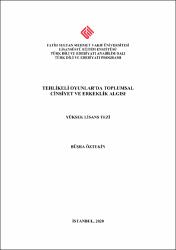Tehlikeli Oyunlar'da Toplumsal Cinsiyet ve Erkeklik Algısı
Citation
ÖZTEKİN, Büşra, Tehlikeli Oyunlar'da Toplumsal Cinsiyet ve Erkeklik Algısı, Fatih Sultan Mehmet Vakıf Üniversitesi Lisansüstü Eğitim Enstitüsü Türk Dili ve Edebiyatı Anabilim Dalı, Yayımlanmamış Yüksek Lisans Tezi, İstanbul 2020.Abstract
Bu çalışmada, Oğuz Atay’ın Tehlikeli Oyunlar adlı eserindeki erkeklik rolleri incelenmeye çalışılmıştır. Romanda sessizliğini koruyan, öteki ile varolan, kamusal alanda/hane içinde farklı şekillerde konumlanabilen kadın kahramanlar ile toplumsal sorumluluklar, kabuller ve beklentiler altında ezilen erkek kahramanların ilişkileri bu çalışmada konu edilmiştir
Tehlikeli Oyunlar, cinsiyete ve toplumsala dair kalıp davranışlar, görünümler izlenmiştir. Tehlikeli Oyunlar’ın postmodern özelliği göz önünde tutularak erkek/lik davranışlarının ironi, dalga, hafif alma yöntemiyle farklılaştırıldığı dikkate alınıp okunmaya çalışılmıştır.
Yapılan edebi incelemede, anlatıcının erkeğe ve kadına atfettiği cinsiyetçi söylemin toplumsal cinsiyet yargılarıyla örtüştüğü yerler olduğu dikkat çekmiştir. Dolayısıyla merkeze edebi metni oturttuğumuz bu çalışmada, kadınlık ve erkeklik rollerine dair söylemin, yargıların roman kahramanlarında da karşımıza çıktığını gözlemlemekteyiz.
Çalışmamızda erkek kahramanların aileden veya sosyal/homososyal ortamlardan öğrendiklerine, toplumsal algılara, ilişkilere, söylemlere-kodlara özellikle dikkat edilmiştir. Eserde erkek kahramanların gerçeklikle kurduğu ilişkide, gerçeği algılama şeklinde, varoluşsal buhranları ve yaşama dair sorunlarında erkekliğin konumu ve etkisi de incelenmiştir.
Oğuz Atay’ın Tehlikeli Oyunlar adlı eserinde erkeklik ve kadınlık rollerinin hangi ölçüde ve bağlamlarda ataerkil toplum yapısından ne şekilde etkilendiği ve eserin doğduğu toplumun siyasi-sosyal özelliklerinin cinsiyet rollerine ne şekilde etki ettiği ortaya konmak istenmiştir. In this study, the roles of masculinity in Oğuz Atay's novel “Tehlikeli Oyunlar” (Dangerous Games) have been examined. The relationship between the female protagonists who remain silent, exist with the other, and can be positioned in different ways in the public space / household, and the male protagonists who are oppressed under social responsibilities, approvals and expectations have been discussed in this study.
By examining the novel “Tehlikeli Oyunlar,” all stereotyped behaviors regarding gender and society have been taken into consideration. While keeping in mind its postmodern characteristic, Tehlikeli Oyunlar has been examined with an eye to look for how the male / masculine behavior is differentiated by the methods of irony, ridicule and belittling.
In the literary study, it has been noticed that there are places in the novel where sexist discourse attributed by the narrator to man and woman coincides with the gender judgments. Therefore, in this study where we have put the literary text in the center, we observe that the discourse regarding the roles of femininity and masculinity, and judgments appear in the protagonists of the novel too.
In this study, special attention was paid to social perceptions, relationships, discourses, codes and what male protagonists learn from family or social / homosocial environments. In the novel, the position and effect of masculinity are also examined in the relationship established by the male protagonists with reality, in the form of perception of reality, existential crises and problems of life.
It has been tried to put forth in this study that how the roles of masculinity and femininity are influenced by the patriarchal social structure. Also, it has beentried to understand that how the politico-social characteristics of the society, in which the literary work in question was born, influenced the gender roles.



















